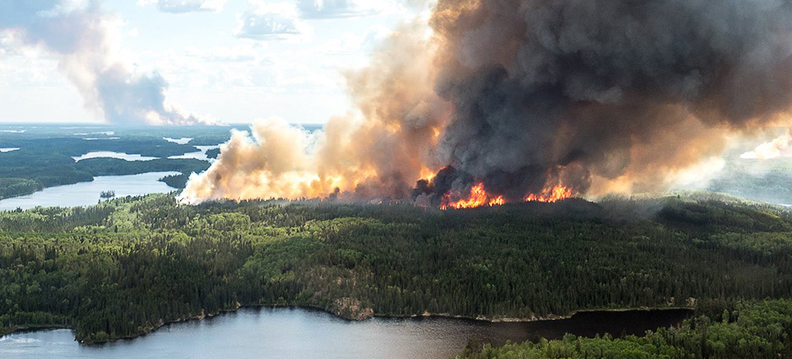The Saskatchewan Public Safety Agency held a conference today speaking about the Province’s wildfire response.
In the conference, the SPSA explained that, as of the time the conference took place, there were 54 active wildfires taking place in the province, with 370 wildfires taking place so far this year.
Saskatchewan’s ten-year average for forest fires currently sits at 415, with the five-year average sitting at 312.
The largest wildfire year ever recorded in the province was 720 fires in 2015.
Of the current active wildfires, 34 are under current assessment; 3 fires are classified as contained; 11 are classified as protecting properties; and 6 of the fires are not yet contained.
Throughout this year’s fire season, 1.2 million hectares have been burned; the ten-year average is 442,000 hectares, with the largest number of fires being recorded in 2015 and measured at 1.7 million hectares.
According to the SPSA, there are two fires taking priority in the province.
The first fire, which is classified as not contained, is burning East of Fond Du Lac with a current size of 3,990 hectares and has caused an evacuation of priority 1 residents in the community due to heavy smoke in the area.
Type 1 and type 2 fire crews, helicopters, and air tankers are currently fighting the fire.
The second Fire, which is burning west of Wollaston Lake along Highway 905, is classified as not contained, and its current size is 4,160 hectares.
Type 1 and Type 2 helicopter crews are on site, along with air support as required.
Steve Roberts, SPSA Vice President of Operations, said that as the long weekend approaches, people need to be cognizant of possible fire-starting activities.
“With the long weekend, folks need to be cognizant of the activities that they’re carrying out, so be careful with your campfires,” he said. “Even though we have had scattered rain throughout the area, we could have areas that are dry and susceptible to fires. Keep your campfires contained and extinguish them when you leave.”
Roberts explained that campfires aren’t the only thing people should be aware of when enjoying their weekend.
“Be cautious as well with all-terrain vehicles that you may be using, again for the same reason, dry conditions; all-terrain vehicles can indeed cause sparks, or if you’re using them in remote areas and you’re stopping for a break, keep that in mind that some of the fuel types out there are still fairly dry, and the last one related to that, and I know it’s the long weekend, but if the conditions are dry in the area, be cautious about using fireworks; they are often the ones that, if not controlled, will also lead to unwanted wildfires.”
Roberts went on to say that the bulk of the wildfires started this year were caused by humans.
The SPSA’s wildfire response conference was held on August 1.
